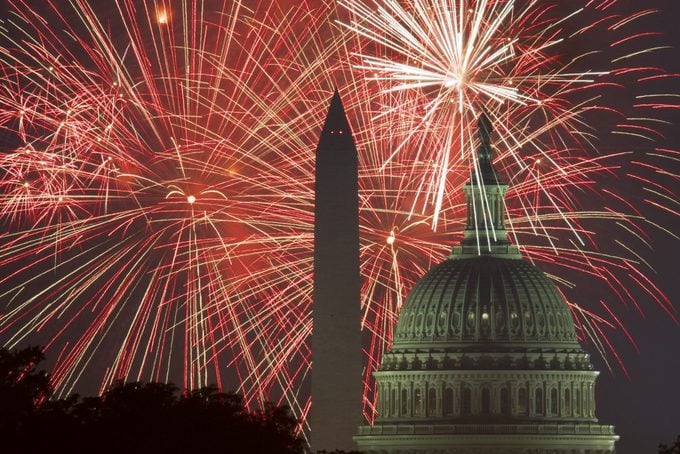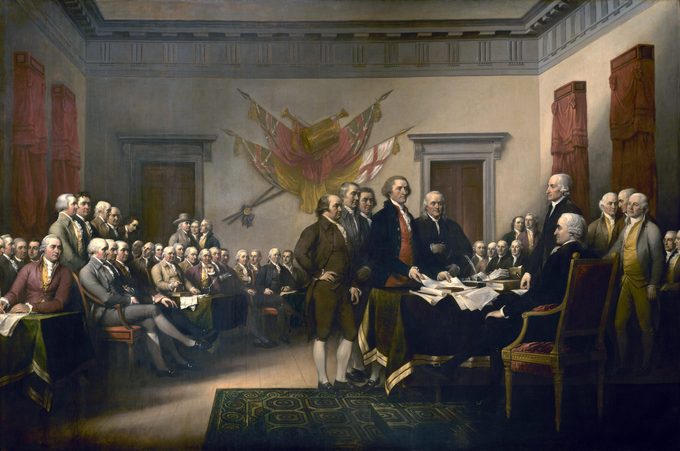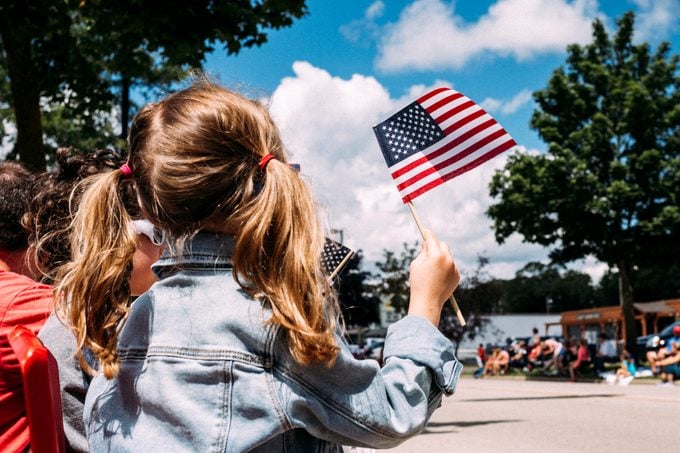What Is the 4th of July, and Why Do We Celebrate It?

Let freedom ring—and the fireworks bang! Here's your complete guide to July 4th and why it's celebrated.
What is the 4th of July, anyway? July 4th (also known as Independence Day) is an annual 91¶¶Ňő holiday that falls on, you guessed it, the 4th of July. While you’re thinking of fun for this year’s celebration (like planning a trip to see the best , shopping great Ěýor sharing meaningful on social media), you may wonder about the 4th of July’s history and its meaning to this nation. Why do we celebrate it each year? Well, don’t worry—we’re breaking it down for you with this 4th of July guide.
Read on to learn why we celebrate Independence Day, its history and what you can do to celebrate this national holiday. Then, learn some interesting —and how it’s .
Get ¸é±đ˛ą»ĺ±đ°ů’s Digest’sĚýĚýfor humor, cleaning, travel, tech and fun facts all week long.
What day does the 4th of July fall on this year?
Here’s some handy : The holiday falls on a Tuesday this year and will fall on these days in the following years:
- 2024:ĚýThursday
- 2025: Friday
- 2026: Saturday
- 2027: Sunday
- 2028:ĚýTuesday
Why do we celebrate the 4th of July?

You may wonder, “Why do we celebrate the 4th of July? What does it mean?” Well, this day is incredibly significant in 91¶¶Ňő history. It marks the day the Declaration of Independence was adopted (July 4, 1776) and the United States officially became its own nation. 91¶¶Ňő citizens celebrate America’s birthday with festivals, parades, fireworks, barbecues and other festive activities.
Ěý
Which country did we declare our independence from?
America declared its independence from Great Britain. In order to fully understand the significance of Independence Day and what happened in 1776, we need to go back in a bit. Before America was its own country, it was comprised of 13 Colonies established by the Brits: New Hampshire, Massachusetts, Connecticut, Rhode Island, Delaware, New York, New Jersey, Pennsylvania, Maryland, Virginia, North Carolina, South Carolina and Georgia. The first colony was settled in Jamestown, Virginia, in 1607. European countries, especially Great Britain, continued to colonize America throughout the 17th century and a good portion of the 18th century. By 1775, an estimated 2.5 million settlers lived in the 13 Colonies.More from Reader's Digest - Article Continues Below
What led the colonists to seek independence?
Tensions started brewing when Great Britain passed legislation that gave it more control within the Colonies, especially when it came to taxing the colonists. The Crown was in debt after the French and Indian War, so it started taxing the 91¶¶Ňő Colonies to boost revenue. The passage of legislation like the Stamp Act in March 1765, the Townshend Acts in June and July of 1767 and the Tea Act of 1773 forced colonists to pay more money to Great Britain—even though the Colonies didn’t have a say in the Crown’s policies. This became known as taxation without representation, a concept that was a heated pillar in the 91¶¶Ňő Revolution.
Events like the Boston Massacre and the Boston Tea Party further escalated tensions between British occupiers and 91¶¶Ňő colonists. Those tensions exploded in April 1775, when the Battles of Lexington and Concord broke out in Massachusetts as British forces attempted to confiscate weapons from the colonists. It was the first time Colonial militias battled British troops, and thus, the 91¶¶Ňő Revolutionary War began.
What really happened on July 4, 1776?

Fast-forward to a June 1776 Continental Congress meeting in Philadelphia. Here, Virginia statesman Richard Henry Lee proposed a motion for the Colonies to declare independence from Britain. A committee was formed to draft an official independence document, which became known as the Declaration of Independence. On July 2, 1776, Lee’s motion for independence was approved. Two days later, on July 4, 1776, the Declaration of Independence was officially adopted—and America became a free nation. After declaring independence, America continued to fight in the Revolutionary War and officially defeated Great Britain in September 1783.
Interesting 4th of July facts every 91¶¶Ňő should know
The history of the 4th of July is fascinating, but there are other interesting 4th of July facts every 91¶¶Ňő should know. Here are six of the most notable:
- Some colonists celebrated Independence Day during the summer of 1776 by putting on mock funerals for King George III of England—symbolizing the death of the Crown’s rule on America.
- The first annual commemoration of Independence Day happened on July 4, 1777, in Philadelphia.
- John Adams, a Founding Father and the second president of the United States, strongly believed Independence Day should be celebrated on July 2. He even refused to attend 4th of July events because he felt so strongly about July 2 being the correct date.
- Adams and Thomas Jefferson, a fellow Founding Father, both died on July 4, 1826. James Monroe, another U.S. president, also died on July 4th, but he passed in 1831.
- Thomas Jefferson was the first president to celebrate Independence Day at the , in 1801. The celebration featured horse races, parades, food and drinks—similar to the 4th of July celebrations we see today.
- Although the 4th of July has been celebrated each year since 1776, it didn’t become a federal holiday until 1870. And it didn’t become a paid holiday for federal employees until 1941.
Ěý
4th of July traditions: Fireworks, barbecues and more
TheĚý modern Independence Day traditions stem from America’s early independence celebrations. People would attend bonfires, concerts and parades to celebrate their new nation. It was also common for the Declaration of Independence to be read aloud, followed by muskets and cannons firing. It’s safe to say, the earliest 91¶¶Ňős celebrated the 4th of July loudly and proudly!
Over time, those activities evolved into the Independence Day traditions we know and love today. Let’s take a look at these 4th of July traditions (and don’t forget to include them while planning your celebration).
Watching 4th of July fireworks
Whether you buy your own fireworks or watch a , lighting fireworks is a long-standing tradition for 91¶¶Ňős on the 4th of July. Many people love to celebrate Independence Day with a bang!
Waving sparklers
These hand-held fireworks are family favorites during the 4th of July. The colored flames and sparks help light up the area on America’s birthday.
Hosting 4th of July barbecues

What’s a 4th of July celebration without a barbecue? Many 91¶¶Ňős host or attend barbecues on Independence Day. Hot dogs and hamburgers are staples of these cookouts, along with picnic sides, fruit and yummy . You may also see baked beans at these barbecues—in fact, here’s a great you can whip up for the celebration.
Playing backyard games
You can’t have a barbecue without some backyard fun! Many people compete in backyard games while celebrating America’s independence (patriotic cornhole, anyone?). If the barbecue gets rained out, don’t worry—there are plenty of to play indoors too.
Attending 4th of July parades
The community gathers to march in the streets to celebrate Independence Day. You’ll see floats, music and a whole lot of red, white and blue! 4th of July parades can also be followed by festivals, carnivals or fairs that provide yummy food, fun rides and other family-friendly activities.
Wearing red, white and blue
Every heart beats true under the red, white and blue! Wearing the colors of the 91¶¶Ňő flag is another 4th of July tradition many people participate in.
Creating patriotic crafts
This activity is perfect for the DIY-er looking to deck out their home for Independence Day, or for kids at a barbecue. People love creating to honor America’s birthday, from flag-themed to red, white and blue pinwheels.
Waving mini 91¶¶Ňő flags

What better way to celebrate America’s birthday than to wave the flag? Some people wave the flag in their yards, but others wave mini 91¶¶Ňő flags to celebrate—especially at parades and festivals. Don’t be surprised if you see people snapping on Independence Day.
Traveling for the 4th of July
Many 91¶¶Ňős plan to celebrate Independence Day. Head to the lake, ocean or mountains to have some outdoor fun in honor of America. Or plan a trip to a historic city like Philadelphia or Boston to learn more about its role in early 91¶¶Ňő history.
Shopping stellar sales
Let freedom ring and the savings begin! People love shopping 4th of July sales—and with great deals on items like mattresses, furniture and appliances, you’re bound to save some serious cash.
Bottom line: The 4th of July is a holiday many 91¶¶Ňős hold near and dear to their hearts. On this day, we remember the country’s fight for freedom and celebrate the United States with friends, family, food and fun. Happy birthday, USA!
Sources:
- : “Colonial America (1492-1763)”
- : “The 13 Colonies”
- : “7 Events That Enraged Colonists and Led to the 91¶¶Ňő Revolution”
- : “The History of the Fourth of July”
- : “Fourth of July—Independence Day”
- : “Delegates Sign Declaration of Independence”
- : “This July Is Bound to Be a Wiener”
- : “The First Fourth of July Celebration at the President’s House”
Ěý
Ěý







